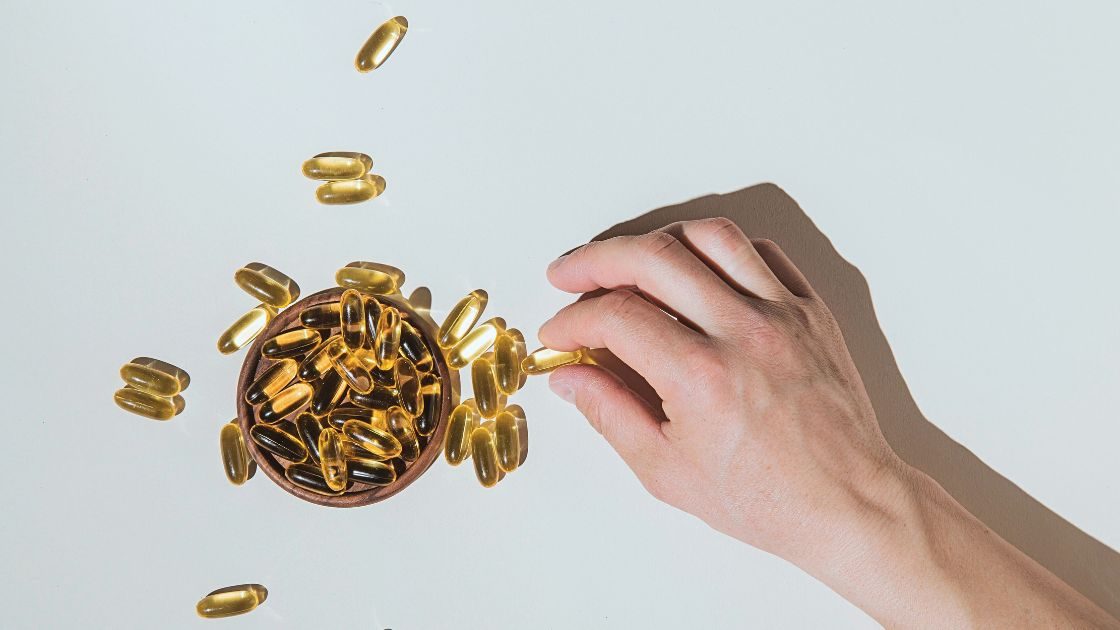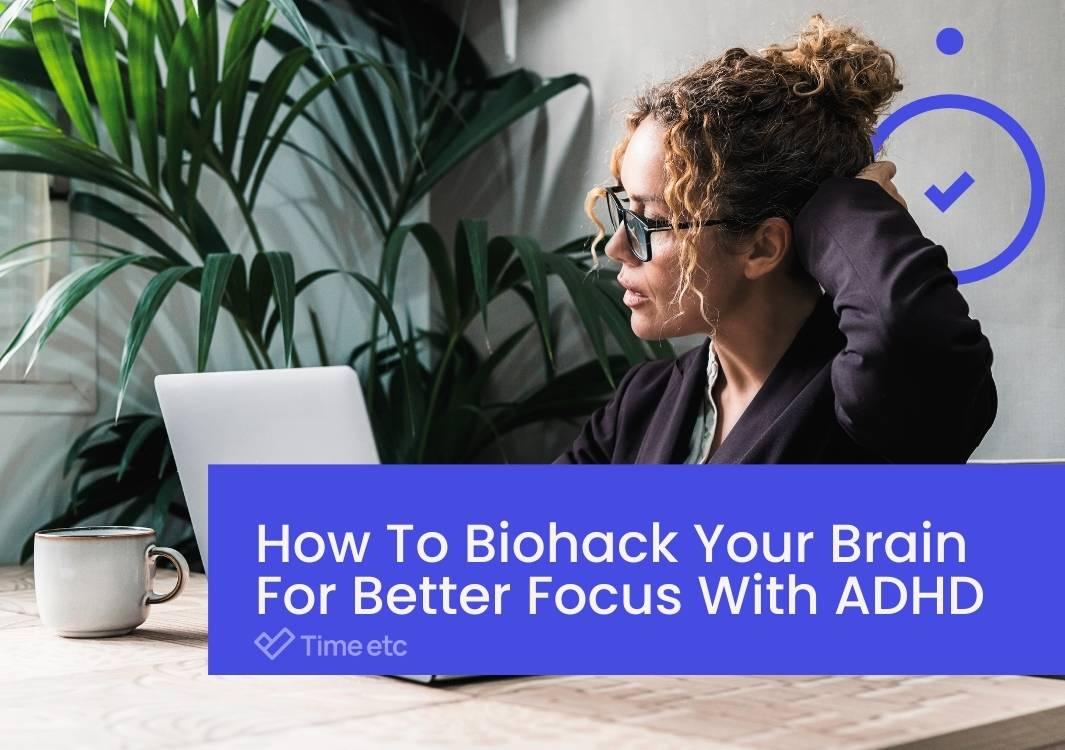As a founder with ADHD (attention-deficit hyperactivity disorder), you've probably experienced the unique paradox of having a brain that can hyperfocus on your passion project for twelve hours straight, then struggles to answer a single email the next day.
The entrepreneurial journey comes with an extra layer of complexity when your executive function is unpredictable, and typical productivity advice often falls short for ADHD brains.
The fact is, your unique neurological wiring requires a more personalized toolkit. Small, intentional shifts in daily routines, nutrition, and even movement can help regulate the mental turbulence that ADHD sometimes brings.
This isn’t about forcing yourself into someone else’s ideal productivity template. It's about creating the conditions that make deep focus easier, more natural, and far less exhausting.
In the following sections, you'll find practical, evidence-based methods that support your brain's unique chemistry and structure so you can unlock your full potential as a founder.

What’s going on in ADHD brains?
If you have ADHD, you already know your brain doesn’t quite play by the same rules as everyone else’s. It’s not about lacking willpower or discipline; it’s a neurological difference in how the brain regulates dopamine and manages executive functioning.
Dopamine is the brain’s messenger for reward, motivation, and mood. It’s that spark to get started, the satisfaction of progress, and the emotional lift when you’ve accomplished something. Executive functions such as planning, prioritizing, and organizing also rely on dopamine.
ADHD brains, however, have lower baseline levels of dopamine and fewer dopamine receptors.
Because dopamine is deeply tied to the brain’s reward system, tasks that don’t offer immediate gratification or clear rewards feel especially difficult to start or stick with, no matter how important they are.
This neurochemical imbalance also means that the brain’s reward system struggles to tag certain tasks as important enough to hold attention. Without that internal “payoff” signal, focus drifts toward anything that offers more immediate stimulation—whether it’s a buzzing phone, a passing thought, or the sound of someone walking down the hall.
In this state, attention becomes less like a spotlight and more like a motion sensor, constantly drawn to whatever promises the quickest burst of novelty or interest. This is why distractions are a daily battle for those with ADHD: the brain is essentially on a constant hunt for ways to boost dopamine, even if that means abandoning what it was doing just moments before.
But these neurological differences don’t mean you’re broken; it means your brain is wired for bursts of creativity, problem-solving under pressure, and seeing connections others might miss. But it also means that the usual “just focus harder” advice isn’t going to cut it. Understanding this wiring is the first step to building systems that work with your brain instead of against it.
Why biohacking?
There's no denying that medication can be a game-changer for managing ADHD, helping to sharpen focus and reduce impulsivity. However, nearly 87% of adults choose to stop taking it within the first year, often because of side effects such as disrupted sleep, increased anxiety, changes in appetite, or a feeling of emotional flatness. Because of these issues, many adults are searching for non-pharmacological interventions that offer fewer risks while still delivering cognitive benefits.
Others face long waits for a formal diagnosis or access to the right prescription. There are also those who prefer to start with lifestyle-based approaches, or to use them alongside medication for a more balanced plan.
This is where biohacking comes in. Typically, this means making small but deliberate adjustments to the way you eat, the supplements you take, and your daily routines, to create better internal conditions for your brain to function.
Before we dive in, a quick note: these strategies are based on research and anecdotal success stories from ADHD founders and professionals. They are not a replacement for medical advice. Always check with a qualified healthcare provider before adding new supplements or making significant lifestyle changes.

Five evidence-based biohacks for better focus
Rather than feeling at the mercy of symptoms, medication schedules, or unpredictable energy swings, here's how you can make it easier for your brain to do what it’s already capable of—just more consistently.
1. A dopamine diet
Your diet provides the fundamental building blocks for neurotransmitters, making it a cornerstone of biohacking for ADHD.
The brain produces dopamine, the key molecule for motivation and focus, from the amino acid tyrosine. Tyrosine itself is synthesized from another amino acid, phenylalanine, which must be obtained from food. By including these in your meals, you give your brain the raw materials it needs for sharper focus.
- Lean protein: Eggs, chicken, turkey
- Fish: Mackerel, sardines, anchovies, salmon, trout, tuna
- Nuts: Almonds, pumpkin seeds, sesame seeds
- Fruits: Avocados, bananas, apples, oranges
- Vegetables: Green leafy vegetables, beetroot, tomatoes
- Dairy: Milk, cheese, yogurt, cottage cheese
- Legumes: Soy, lima beans, velvet beans, peas, peanuts.
Your gut health matters too. Around 50% of your body’s dopamine may be made by gut bacteria. This connection, known as the gut-brain axis, means a healthy intestinal environment is crucial for balanced brain chemistry. Eating probiotic-rich foods such as kefir, kimchi, and sauerkraut can help cultivate a healthy gut microbiome, which in turn supports better mood and focus.
2. Strategic supplements
While a good diet forms the foundation, scientific research shows several nutrients are commonly deficient in people with ADHD, and supplementation can make a measurable difference.
While they’re no replacement for professional care, they can be valuable tools in your biohacking kit.
Magnesium
Magnesium is key for a calm nervous system, helping to improve sleep quality and reduce stress, both of which can be challenging enough for anyone running a business, let alone if you also have ADHD. A 2016 study found that 72% of children diagnosed with ADHD had magnesium deficiencies, and supplementation over eight weeks saw a significant improvement in their behavior and their ability to regulate emotions.
Omega-3 fatty acids
Essential for overall brain structure and function, omega-3 fatty acids are often low in typical Western diets, and studies consistently show that people with ADHD have lower blood levels of these fats, particularly EPA and DHA. While omega-3s are more effective for mood and emotional regulation than direct focus improvement, emotional stability certainly impacts your ability to maintain attention on important tasks.
Vitamin D
Often called the "sunshine vitamin," Vitamin D plays a crucial part in brain development and function. As many founders spend most of their time working indoors, Vitamin D deficiency is pretty common. This deficiency has been linked to increased impulsivity, hyperactivity, and poor attention. Supplementation has been found to improve core ADHD symptoms and is best absorbed when taken with Vitamin K2.
B Vitamins (B3, B6, B9, B12)
This family of vitamins is a powerhouse for brain health, playing a key part in the synthesis of critical neurotransmitters like dopamine, serotonin, and norepinephrine. A study found that adults with ADHD had significantly lower concentrations of vitamins B2, B6, and B9. Look for a high-quality B complex rather than individual vitamins to maintain proper ratios.
Zinc
Low zinc levels have been linked to more intense ADHD symptoms, including higher levels of hyperactivity, trouble focusing, and greater impulsivity. Zinc plays an important role in keeping the brain healthy and helps regulate dopamine, so taking supplements can help bring brain activity back into balance, supporting areas like working memory and self-control.

3. Compounds for cognitive boosts
Alongside a solid nutritional foundation, certain nootropic compounds can offer targeted support for the ADHD brain. These substances influence the neurological pathways that shape attention, memory, and mental stamina, making them worthy considerations for your biohacking toolkit.
L-Theanine
Found almost exclusively in green tea, L-Theanine is an amino acid celebrated for its unique ability to promote a state of "relaxed alertness." It works by increasing alpha brain waves, which are associated with a calm, focused mind, making it ideal for productive work without the jitteriness of stimulants. This is particularly beneficial for ADHD, as it can reduce the underlying anxiety and hyperactivity that often sabotage focus.
L-Tyrosine
This amino acid is a direct precursor to the catecholamine neurotransmitters dopamine and norepinephrine. Since the ADHD brain often struggles with dopamine regulation, providing this essential building block can be a powerful biohacking strategy.
Sabroxy (Oroxylum indicum extract)
Sabroxy is a modern, standardized extract from the Oroxylum indicum tree, containing the flavonoid oroxylin A. This compound has gained attention for its ability to modulate dopamine by inhibiting its reuptake, a mechanism similar to some stimulant medications. Studies have shown that oroxylin A can improve ADHD-like behaviors, including hyperactivity, impulsivity, and attention deficits, by enhancing dopamine neurotransmission.
Bacopa (Bacopa monnieri)
This herb has been used for centuries to enhance neuronal communication and memory. Its relevance to ADHD is supported by a notable open-label study involving children with the condition. After six months of treatment with a standardized Bacopa extract, 85% experienced a reduction in attention-deficit symptoms. The study reported significant improvements in scores for restlessness (93% of children), self-control (89%), learning problems (78%), and impulsivity (67%).
Many of these work best when taken daily for weeks or months, so consistency is key. You may also find it useful to trial one compound at a time before adding another. This helps you pinpoint what’s making a difference.

4. ADHD-friendly adaptogens
Adaptogens are a unique class of herbs and mushrooms that help the body resist and adapt to physical and mental stress. They work by modulating the body's stress-response system, primarily the hypothalamic-pituitary-adrenal (HPA) axis, promoting balance and resilience. Adaptogens can be a key part of biohacking for ADHD as they help create a more stable internal environment.
There are two main types of adaptogens:
Plant-based
Mushrooms
- Reishi (Ganoderma lucidum): Known as the "mushroom of calm," Reishi is prized for its ability to soothe the nervous system and support the body's stress response. It can help reduce the anxiety and restlessness that frequently go hand-in-hand with ADHD.
- Lion’s Mane (Hericium erinaceus): Perhaps the most celebrated mushroom for cognitive health, Lion's Mane contains unique compounds, hericenones and erinacines, that stimulate the production of Nerve Growth Factor (NGF). NGF is crucial for the growth, maintenance, and survival of neurons. By promoting neurogenesis and enhancing brain plasticity, Lion's Mane may support memory, concentration, and overall cognitive function, making it a promising supplement for ADHD.
- Chaga (Inonotus obliquus): Chaga is an antioxidant powerhouse known for its potent anti-inflammatory properties. Chronic neuroinflammation has been linked to cognitive dysfunction, and by reducing inflammation and oxidative stress in the brain, chaga can help create a healthier neurological environment.
5. Focus through fitness
Physical activity can be one of the most reliable tools for boosting motivation, mental clarity, and energy levels.
For many people with ADHD, the effects can feel surprisingly similar to what they experience on medication. That’s because exercise triggers the release of dopamine, norepinephrine, and serotonin, three key neurotransmitters that support attention, emotional balance, and overall cognitive performance. It also boosts levels of brain-derived neurotrophic factor (BDNF), a protein that promotes the growth and resilience of brain cells.
Experts recommend aiming for moderate-intensity exercise most of the time. That means your heart rate is elevated, you’re breathing more quickly, and you’re starting to break a sweat. Your muscles should feel like they’ve been worked by the end of the session, too.
A good target is 30 to 40 minutes a day, four to five days a week. Some of the most effective types of exercise for ADHD include:
- Aerobic (Cardio): Activities like running, brisk walking, cycling, or swimming enhance blood flow to the brain, improve cardiovascular health, and create a lasting lift in mood.
- Martial Arts: Practices such as karate, judo, or taekwondo combine physical conditioning with mental discipline. They sharpen memory, motor coordination, and focus while building self-control and resilience.
- Complex activities: Rock climbing, dance, gymnastics, and yoga all require full-body engagement and mental presence. These activities challenge your coordination, spatial awareness, and problem-solving skills.
- Strength training: Lunges, squats, push-ups, pull-ups, and weightlifting strengthen the body, increase metabolism, and support better posture and energy regulation.
- Team sports: Soccer, softball, basketball, and other group activities add a layer of social connection and camaraderie. The shared goals and team environment can boost confidence and motivation.
Like medication, exercise only works when it’s done regularly. For someone with ADHD, the challenge is often staying consistent, especially when motivation dips or distractions pull attention elsewhere.
- Mix it up so it never feels repetitive. Alternate between different types of workouts to keep your interest high.
- Find a workout partner who can encourage you, check in on your progress, and make it more social.
- Schedule it in the morning to take advantage of the energy and focus boost for the rest of your day.
Remember, exercise complements but doesn’t replace prescribed treatment.

What's the bottom line?
Too often, ADHD is framed solely as a negative. Yes, the struggles are real. Yes, some days feel like you're swimming against the current while everyone else floats effortlessly downstream.
But in a founder’s world, it can be a powerful edge. You might find yourself diving so deeply into a project that hours pass in what feels like minutes. You might spot connections others overlook or come up with fresh solutions before anyone else has even identified the problem. These moments of hyperfocus and creativity can feel electric, and they often become the driving force behind your most impactful ideas.
The biohacking techniques we've explored aren't about "fixing" your brain. They're about giving it what it needs to thrive, so you can leverage its natural strengths to build the business and life you want.
Start experimenting with the biohacks that resonate with you, be patient with the process, and remember: the goal isn't to become someone else. It's to become the most focused, energized, and effective version of yourself.












